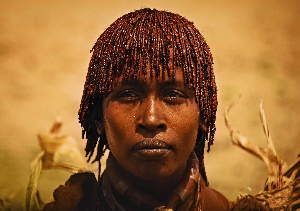Until recently many scientists were of the view that the dark skin color of Africans was a permanent characteristic in their genes; a feature meant to protect those in the African continent against the scorching rays of the sun.
Recent scientific findings show that the early dwellers in Africa had paler skins which later evolved into dark ones. The skin of Africans has undergone various changes over the last 900,000 years, according to the study.
The study provides an insight suggesting that the early African was on the continent some 300,000 years ago. The research indicated that the early men had a relatively pale skin tone compared to the dark skin of people in many parts of Africa now.
This defeats the existing perception that people with whiter skin are more intelligent compared to people with dark skin. If the findings are anything to go by, the skin of Africans was generally not dark, but, one that has changed over a period of time.
Researchers with the University of Pennsylvania, Nicholas Crawford and Sarah Tishkoff, said they arrived at this conclusion after running an analysis of the 1500 samples collected from Ethiopia, Tanzania and Botswana. They said each of the participants voluntarily offered their DNA and their skin pigmentation to be analyzed during the study.
The scientists were able to deduce eight sites in the human genome that are related to the degree of skin pigmentation. They found out that genes had witnessed some changes in its pigmentation for about 30 percent.
The findings said for each of the eight levels of changes they observed in the samples, they observed genes associated with paler skin, which were linked to darker skin. The researchers said seven of the paler skin variants dated at least 270,000 years. Four of them were linked to early men who emerged on the continent 900,000 years ago.
The researchers said they found it surprising that though they picked samples from dark skin Africans, they were able to identify variations in the skin pigmentation. They added that the concept may appear complex, but it possibly explains why some Africans have lighter skins in parts of the continent.
They cited the San-hunter-gatherer inhabitants of South Africa who have lighter skin and have links with early men in Africa.
A researcher at the Institute of Evolutionary Biology in Spain, Carles Lalueza-Fox, said he finds the details interesting, but was of the view the genes can be traced to the San and archaic early men. He said the early men lived together for a long while before they decided to migrate to other parts of the world.
One of the lead researchers, Tishkoff, said three of the variations can be linked to early Africans who had less pigmented skins. She said their findings suggest inhabitants of the Eastern part of Africa may have gained darker skin more recently. She added that their ancestors had lighter skin tones.
She explained that it’s not only light skin that has been witnessing changes in tone over the years but dark skin too. The researchers said these findings will go a long way to shape public discourse on whether skin color can be associated with the intellect and the evolution of man.
The research debunks arguments held by white supremacists that people with whiter skin are superior and more intelligent than dark skin people.
If there is anything argument to make, then Africans were more intelligent because they had paler skin earlier.
Source: face2faceafrica.com
 Home Of Ghana News Ghana News, Entertainment And More
Home Of Ghana News Ghana News, Entertainment And More





